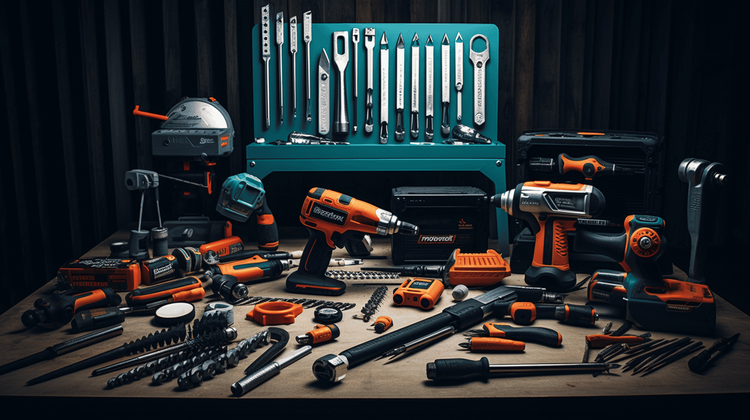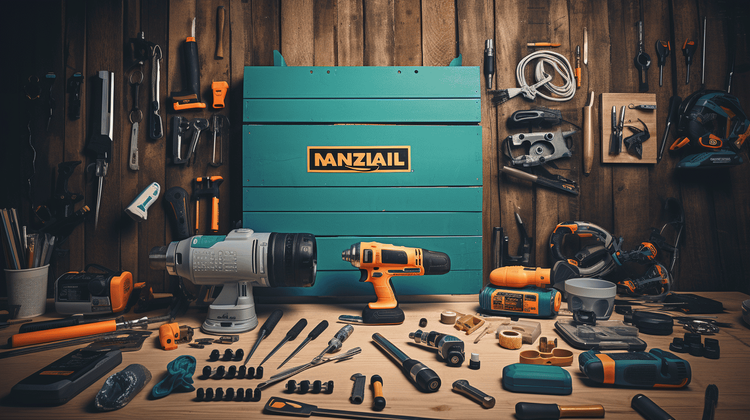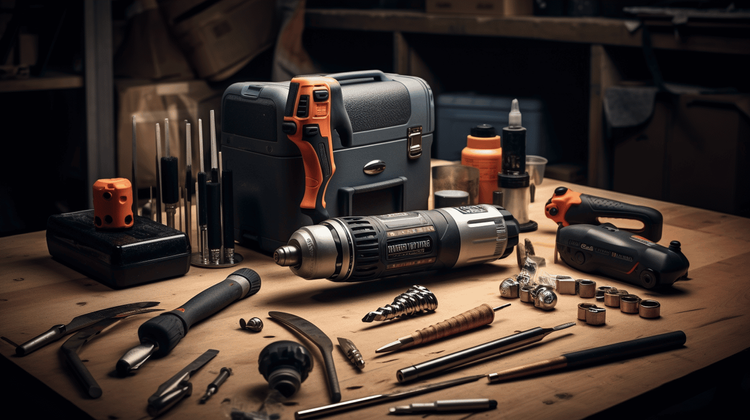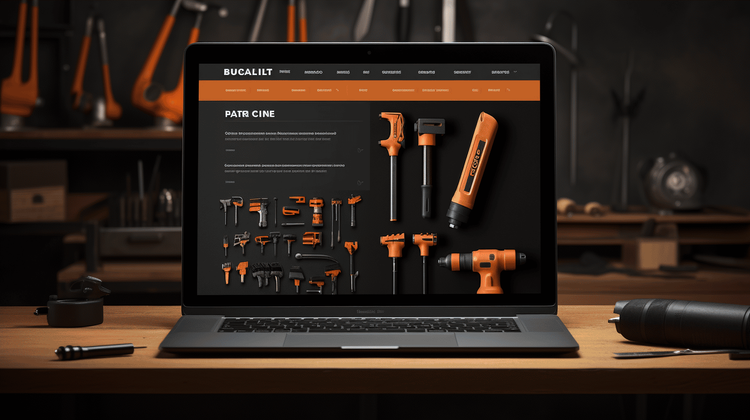Essential Tools Every DIY Enthusiast Should Have

Welcome, fellow DIY enthusiast! Whether you're a seasoned pro or just starting out, having the right tools is essential for any project. From basic hand tools to power tools and specialty equipment, the right tools can make all the difference in the success of your DIY endeavors. In this article, we will explore the essential tools that every DIY enthusiast should have in their arsenal. So, grab a cup of coffee, get comfortable, and let's dive in!
Being equipped with the right tools not only saves you time and effort but also ensures that your projects are completed with precision and care. Whether you're looking to tackle small household repairs or embark on larger home improvement projects, having a well-stocked toolbox will empower you to take on any task with confidence.
In this article, we will cover a range of tools that every DIY enthusiast should have, including basic hand tools, measuring and marking tools, cutting and shaping tools, power tools, fastening tools, safety equipment, organization and storage solutions, as well as specialty tools for specific tasks such as plumbing, electrical work, and painting.
Remember, investing in quality tools is a wise decision. While they may cost a bit more upfront, they will last longer and perform better, ultimately providing you with a better DIY experience. So, let's get started and explore the essential tools that will help you become a DIY superstar!
Basic Hand Tools
When it comes to DIY projects, having the right tools is essential. Basic hand tools are a must-have for any DIY enthusiast. These tools are versatile, handy, and can be used for a wide range of tasks. Whether you're hanging a picture frame or assembling furniture, here are some basic hand tools that every DIY enthusiast should have in their toolbox:
- Hammer: A hammer is a universal tool that is used for driving nails and pulling them out. It's important to have a hammer with a comfortable grip and a sturdy head. Look for one with a claw on the back for removing nails.
- Screwdriver Set: A set of screwdrivers with different sizes and types of heads is a must-have. Whether you're tightening screws on furniture or installing new electrical outlets, a screwdriver set will come in handy. Look for a set that includes both flathead and Phillips-head screwdrivers.
- Pliers: Pliers are used for gripping, bending, and cutting. They are great for various tasks, such as twisting wires, pulling out nails, and holding objects firmly in place. Look for a pair with a comfortable grip and a sturdy construction.
"Having the right tools is like having a superpower. With basic hand tools, you'll be equipped to handle a wide range of DIY projects."
Measuring and Marking Tools
When it comes to DIY projects, precision is key. Whether you're measuring and marking materials for cutting or ensuring everything is level and aligned, having the right tools for the job is essential. Here are some must-have measuring and marking tools that every DIY enthusiast should have in their toolkit:
- Tape Measure: A tape measure is a versatile tool that allows you to accurately measure lengths, widths, and heights. Look for a tape measure that has both imperial and metric markings for added convenience.
- Level: A level is used to ensure that surfaces, such as shelves or picture frames, are perfectly horizontal or vertical. It's an essential tool for achieving professional-looking results. There are different types of levels, including bubble levels and laser levels, depending on your needs and preferences.
- Chalk Line: If you need to create straight lines over long distances, a chalk line is the tool for the job. It consists of a reel filled with colored chalk and a string. After snapping the string against the surface, it leaves behind a temporary chalk line that serves as a guide for your cuts or installations.
Having these measuring and marking tools in your arsenal will make your DIY projects more accurate and efficient. They'll help you achieve professional results and save you from making costly mistakes.
Cutting and Shaping Tools
When it comes to tackling DIY projects, having the right cutting and shaping tools is essential. Whether you're working with wood, metal, or other materials, these tools will help you achieve precise and clean cuts, and shape your materials to fit your project requirements. Here are some must-have cutting and shaping tools that every DIY enthusiast should have in their arsenal:
Utility Knife
A utility knife is a versatile tool that can be used for a wide range of cutting tasks. It has a retractable blade that can be easily replaced when it becomes dull. A utility knife is perfect for cutting through materials such as cardboard, drywall, carpet, and even thin sheets of wood. Its compact size and sharp blade make it ideal for precise and detailed cuts.
Handsaw
A handsaw is a staple tool for cutting wood. It comes in various sizes and designs, but a basic handsaw with a sturdy handle and a sharp blade will suffice for most DIY projects. Whether you need to cut boards, trim branches, or make rough cuts, a handsaw is a reliable tool to have on hand. Make sure to choose a handsaw with a comfortable grip and teeth that are suitable for the type of wood you'll be cutting.
Chisel Set
A chisel set is essential for shaping and carving wood. It consists of different-sized chisels with sharp cutting edges that can be used to remove excess material and create intricate woodwork. Chisels come in various shapes, such as flat, round, and skew, allowing you to achieve different cuts and angles. To ensure optimal performance and longevity, invest in a high-quality chisel set made of strong and durable materials.
These cutting and shaping tools will help you achieve precise and clean cuts, and shape your materials to fit your project requirements. Whether you're working with wood, metal, or other materials, having these tools in your DIY arsenal will make your projects much easier and more efficient.
"A good carpenter never blames their tools, but having the right tools definitely makes the job easier." - Unknown
With these cutting and shaping tools in your toolbox, you'll be well-equipped to tackle a wide range of DIY projects. Remember to always prioritize safety when using cutting tools, and follow proper techniques to ensure accurate and smooth cuts.
Power Tools
Power tools are a must-have for any DIY enthusiast. They help you tackle larger projects and make your work faster and more efficient. Here are some essential power tools that every DIY enthusiast should have in their arsenal:
- Power Drill: A power drill is a versatile tool that can be used for a wide range of tasks, from drilling holes to driving screws. Look for a drill with multiple speed settings and a keyless chuck for easy bit changes. Consider getting a cordless drill for added convenience and mobility.
- Circular Saw: A circular saw is perfect for making straight cuts in wood, plywood, and other materials. Look for a saw with a comfortable grip and an adjustable cutting depth. A cordless circular saw is great for working in areas without access to an electrical outlet.
- Jigsaw: A jigsaw is ideal for making curved cuts and intricate designs. It is commonly used for cutting out shapes in wood, plastic, and metal. Look for a jigsaw with variable speed settings and a beveling base for angled cuts.
Power tools can make your DIY projects easier and more efficient, but it's important to use them safely. Here are some tips for using power tools:
- Always wear protective gear, such as safety glasses and earplugs, when using power tools.
- Familiarize yourself with the tool's user manual and follow the manufacturer's instructions.
- Ensure the tool is in good working condition before use. Check for any loose parts or damaged cords.
- Use the appropriate blade or bit for the task at hand. Using the wrong blade or bit can result in poor performance and potential hazards.
- Secure your workpiece properly before using a power tool. Use clamps or other holding devices to keep it in place.
- Keep your work area clean and well-lit. Remove any obstacles that could potentially cause accidents.
Investing in quality power tools is essential for any DIY enthusiast. While they may cost more upfront, they will save you time and frustration in the long run. Remember to always prioritize safety and take the time to learn how to properly use and maintain your power tools. So go ahead, power up your DIY projects with these essential power tools!
Fastening Tools
When it comes to completing DIY projects, having the right fastening tools is essential. These tools help you securely join materials together, ensuring that your projects are sturdy and long-lasting. Whether you're hanging up shelves, building a wooden deck, or putting together furniture, having the right fastening tools will make your job much easier. Here are some must-have fastening tools for every DIY enthusiast:
Cordless Drill
A cordless drill is a versatile tool that every DIY enthusiast should have in their toolbox. With a cordless drill, you can drill holes and drive screws without the hassle of dealing with cords. Look for a drill that offers different speed settings so you can adjust it according to your needs. Opt for one with a lithium-ion battery, as they offer longer battery life, faster charging, and more power.
Nail Gun
A nail gun is an invaluable tool when it comes to fastening materials together quickly and efficiently. It is perfect for installing trim, molding, or building wooden structures. With a nail gun, you can drive nails into materials with ease, saving you significant time and effort. Make sure to choose a nail gun that suits the type and size of nails you plan to use for your projects.
Staple Gun
A staple gun is an essential tool for upholstery, carpeting, and other projects that require fastening materials with staples. It is perfect for attaching fabric, securing wires, and many other applications. Look for a staple gun with an adjustable depth control feature, as it allows you to set the staple depth according to the material you are working with. Additionally, choose a staple gun with an ergonomic design for comfortable use during extended periods.
Remember to always practice proper safety measures when using fastening tools. Wear protective eyewear and gloves to protect yourself from flying debris and potential injuries. Additionally, make sure to read and follow the manufacturer's instructions for each tool to ensure safe and effective use.
Having these fastening tools in your DIY arsenal will make your projects faster, more efficient, and more professional-looking. Whether you're a seasoned DIY enthusiast or just starting, investing in these tools will help you tackle a wide range of projects with ease.
So, stock up on these essential fastening tools and get ready to take on your next DIY project like a pro!
Safety Equipment
When it comes to DIY projects, safety should always be a top priority. Accidents can happen, but with the right safety equipment, you can minimize the risks and protect yourself from potential harm. Here are some essential safety tools every DIY enthusiast should have:
Safety Glasses
- Safety glasses are crucial for protecting your eyes from flying debris, dust, and chemical splashes.
- They should be impact-resistant and have side shields for added protection.
- Whether you're working with power tools, painting, or even gardening, safety glasses should always be worn.
Work Gloves
- Work gloves provide hand protection against cuts, abrasions, and punctures.
- They offer a better grip and prevent your hands from getting sweaty, reducing the risk of slipping.
- Choose gloves made from durable materials like leather or synthetic fibers, depending on the type of work you're doing.
Dust Mask
- A dust mask is essential for filtering out harmful particles and dust while working in dusty environments, such as sanding or cutting wood.
- Look for masks that are NIOSH-rated N95 or higher for the best filtration efficiency.
- Masks with valves make breathing easier by reducing heat and moisture buildup.
Hearing Protection
- When working with loud power tools or in noisy environments, it's crucial to protect your hearing.
- Earplugs or earmuffs can help reduce noise levels and prevent potential hearing damage.
- Look for products with a high noise reduction rating (NRR) for optimal protection.
Safety Helmet
- For jobs that involve working at heights or overhead, a safety helmet is a must.
- Helmets protect your head from falling objects and provide impact resistance.
- Look for helmets that meet safety standards and have adjustable features for a comfortable fit.
Safety Vest
- If you're working near traffic or in low visibility areas, wearing a safety vest can make you more visible to others.
- Safety vests are made with reflective materials and bright colors to ensure maximum visibility.
- They're especially important if you're working on road repairs or construction projects.
Remember, safety should never be compromised. Investing in the right safety equipment will not only protect you from potential accidents but also give you peace of mind while tackling your DIY projects.
Organization and Storage
As a DIY enthusiast, it's important to keep your tools organized and easily accessible. Having a well-organized workspace not only saves you time, but it also helps to keep your tools in good condition. Here are some essential organization and storage tools that every DIY enthusiast should have:
Toolbox
A toolbox is a must-have for any DIY enthusiast. It's a portable storage solution that allows you to keep your tools organized and easily transport them from one location to another. Look for a toolbox with compartments or drawers to store smaller items such as screws, nails, and drill bits. Choose one with a sturdy handle and latch to ensure your tools are secure during transport.
Shelving Unit
A shelving unit is a great way to organize your larger tools and equipment. It provides a designated space for items such as power tools, hand tools, and paint cans. Opt for a sturdy and adjustable shelving unit that can accommodate different sizes and weights of tools. This way, you can easily customize the shelves to fit your specific storage needs.
Pegboard
A pegboard is a versatile tool storage system that allows you to hang your tools on hooks for easy access. It's an effective way to keep your tools visible and organized. Choose a pegboard with a variety of hook sizes to accommodate different tools. You can also add shelves or bins to hold smaller items. Hang the pegboard in a convenient location, such as above your workbench, to maximize its usefulness.
When organizing and storing your tools, keep in mind the following tips:
- Group similar tools together: This makes it easier to find what you need when you're working on a project.
- Use labels: Labeling your storage containers or compartments makes it easy to identify the contents at a glance.
- Keep frequently used tools within reach: Store the tools you use most often in an easily accessible location, such as on a pegboard or in a top drawer of your toolbox.
- Clean and maintain your tools: Regularly clean and oil your tools to prevent rust and ensure they remain in good working condition.
By investing in proper organization and storage tools, you'll not only keep your workspace tidy, but also extend the lifespan of your tools. Remember, a well-organized area is a productive area, so take the time to set up a functional and efficient storage system for your DIY projects.
Specialty Tools
While basic hand tools and power tools are essential for any DIY enthusiast, there are also specialty tools that can make certain tasks much easier and more efficient. These tools are designed for specific jobs and can help you tackle more advanced projects. Here are some specialty tools that every DIY enthusiast should consider adding to their collection:
Plumbing Tools
- Pipe Wrench: A pipe wrench is designed to grip and turn pipes and fittings. It has adjustable jaws that allow you to tighten or loosen pipes easily.
- Plunger: A plunger is a must-have for any DIY plumber. It can help you clear clogged drains and toilets by creating a suction that dislodges blockages.
- Pipe Cutter: If you need to cut pipes during your plumbing projects, a pipe cutter is essential. It provides clean and precise cuts without the need for sawing.
Electrical Tools
- Wire Stripper: When working with electrical wires, a wire stripper is essential for removing the insulation from the wire without damaging the conductor. It ensures a clean and secure connection.
- Voltage Tester: A voltage tester allows you to check if electrical circuits are live or not. This is crucial for ensuring your safety when working with electricity.
- Wire Crimper: If you need to make secure and professional electrical connections, a wire crimper is a must-have tool. It crimps connectors onto wires, providing a strong and reliable connection.
Painting Tools
- Paint Sprayer: If you have a large painting project ahead, a paint sprayer can save you a lot of time and effort. It allows for a smooth and even application of paint on surfaces.
- Paint Edger: A paint edger is perfect for achieving clean and straight lines along edges and corners. It prevents paint from bleeding onto adjacent surfaces, giving your paint job a professional finish.
- Paint Roller Extension Pole: To reach high walls or ceilings without the need for a ladder, a paint roller extension pole is essential. It allows you to paint hard-to-reach areas with ease.
Remember, specialty tools may not be used as frequently as basic hand tools, but they can greatly simplify specific tasks and enhance the quality of your work. It's important to invest in good-quality specialty tools to ensure their durability and performance.
"Having the right specialty tools can make all the difference when tackling specific DIY projects. Whether you're working on plumbing, electrical, or painting tasks, having the appropriate tools can save you time and frustration. So, consider investing in these specialty tools to take your DIY game to the next level."
Conclusion
In conclusion, having the right tools is essential for any DIY enthusiast. Whether you're a beginner or a seasoned pro, the right tools can make all the difference in the success of your projects. Investing in quality tools not only saves you time and frustration but also ensures the safety of both you and your work.
Remember, a good set of basic hand tools is a must-have for any DIY enthusiast. A hammer, screwdriver set, and pliers will come in handy for a wide range of tasks. Measuring and marking tools like a tape measure, level, and chalk line will help you achieve precision and accuracy in your projects. Cutting and shaping tools such as a utility knife, handsaw, and chisel set are essential for any cutting or shaping tasks you may encounter.
Power tools offer efficiency and speed when it comes to heavy-duty projects. A power drill, circular saw, and jigsaw can tackle a variety of tasks with ease. Fastening tools like a cordless drill, nail gun, and staple gun make securing materials quick and easy.
Don't forget about safety! Equip yourself with safety glasses, work gloves, and a dust mask to protect yourself while working with tools and materials. Safety should always be a top priority.
To keep all your tools organized and easily accessible, invest in a toolbox, shelving unit, or pegboard. This will save you time and frustration when searching for the right tool in the middle of a project.
Lastly, consider specialty tools that cater to specific tasks such as plumbing, electrical work, or painting. These tools can make specialized projects much easier and more efficient.
Remember, Ultra Handy is here to help you succeed in your DIY endeavors. Check out our eCommerce Amazon store for a wide range of tools and accessories to support your DIY projects. Whether you're passionate about woodworking, plumbing, or gardening, we have the perfect tools for you.
So, get your tools ready, put on your DIY hat, and let your creativity shine. With the right tools and a little bit of know-how, there's no limit to what you can accomplish. Happy DIYing!
Visit Ultra Handy's Amazon store for all your DIY needs
Frequently Asked Questions
- What are the essential tools every DIY enthusiast should have?The essential tools every DIY enthusiast should have are: 1. Screwdriver set, 2. Hammer, 3. Tape measure, 4. Power drill, 5. Adjustable wrench.
- Why is a screwdriver set important for DIY projects?A screwdriver set is important for DIY projects as it allows you to loosen or tighten screws of different sizes and types. It is a versatile and essential tool for various home improvement tasks.
- How can a hammer be useful for DIY enthusiasts?A hammer is a versatile tool that can be used for multiple DIY projects such as driving nails into walls, adjusting furniture, or removing old fixtures. It is a must-have tool for any DIY enthusiast.
- Why should I have a tape measure in my DIY toolkit?A tape measure is important for accurate measurements in DIY projects. Whether you are measuring a room for new furniture or marking dimensions for a home improvement project, a tape measure is essential for precision.
- What tasks can I accomplish with a power drill?A power drill is a versatile tool that can be used for drilling holes, driving screws, sanding, polishing, and more. It speeds up the DIY process and makes tasks like hanging shelves or assembling furniture much easier.




